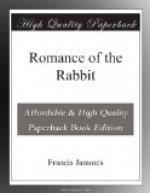Then a doubt, stronger than all the doubts which hitherto had assailed the soul of Rabbit, pierced him.
* * * * *
This doubt was a leaden grain of shot which had just passed through the nape of his neck behind his long ears into his brain. A veil of blood more beautiful than the glowing autumn floated before his eyes in which the shadows of eternity rose. He cried out. The fingers of a huntsman pinioned his throat, strangled him, suffocated him. His heart-beat grew weaker and weaker; this heart which used to flutter like the pale wild rose in the wind dissolving at the morning hour when the hedge softly caresses the lambs. An instant he remained motionless, hollow-flanked and drawn-out like Death itself in the grasp of his murderer. Then poor old Rabbit leaped up. He clawed in vain for the ground which he could no longer reach because the man did not let go of him. Rabbit passed away drop by drop.
Suddenly his hair stood erect, and he became like unto the stubble of summer where he formerly dwelled beside his sister, the quail, and the poppy, his brother; and like unto the clayey earth which had wetted his beggar’s paws; and like unto the gray-brown color with which September days clothe the hill whose shape he had assumed; like unto the rough cloth of Francis; like unto the wagon-track on the roadway from which he heard the packs of hounds with hanging ears, singing like the angelus; like unto the barren rock which the wild thyme loves. In his look where now floated a mist of bluish night there was something like unto the blessed meadow where the heart of his beloved awaited him at the heart of the wild sorrel. The tears which he shed were like unto the fountain of the seraphs at which sat the old fisher of eels repairing his lines. He was like unto life, like unto death, like unto himself, like unto his Paradise.
END OF THE ROMANCE OF THE RABBIT
TALES
PARADISE
The poet looked at his friends, his relatives, the priest, the doctor, and the little dog, who were in the room. Then he died. Some one wrote his name and age on a piece of paper. He was twenty-eight years.
As they kissed his forehead his friends and relatives found that he was cold, but he could not feel their lips because he was in heaven. And he did not ask as he had done when he was on earth, whether heaven was like this or like that. Since he was there, he had no need of anything else.
His mother and father, whether or not they had died before him, came to meet him. They did not weep any more than he, for the three had really never been separated.
His mother said to him:
“Put out the wine to cool, we are about to dine with the Bon Dieu under the green arbor of the Garden of Paradise.”
His father said to him:




